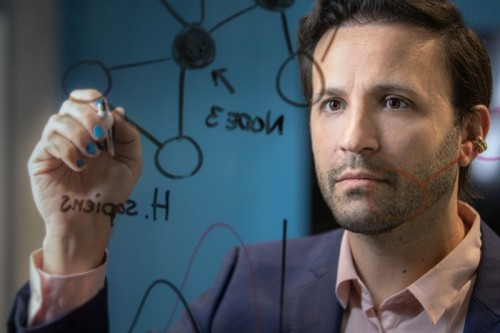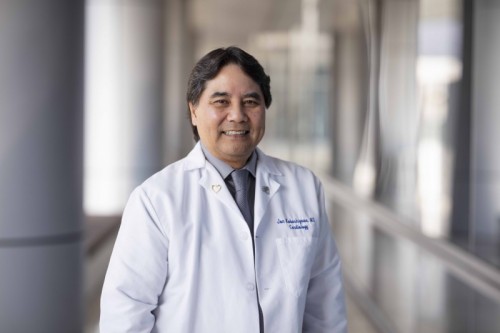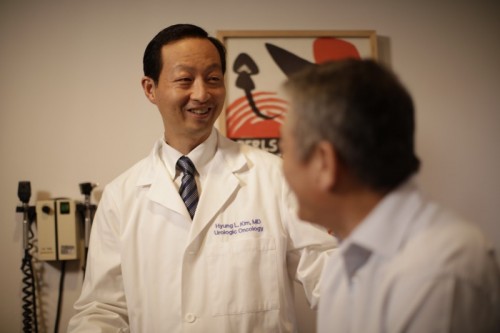February Research Highlights
A Roundup of the Latest Medical Discoveries and Faculty News at Cedars-Sinai
 Cedars-Sinai Welcomes Biomedical Data Science Expert
Cedars-Sinai Welcomes Biomedical Data Science Expert
Nicholas Tatonetti, PhD, an expert in biomedical data science, has joined Cedars-Sinai as the vice chair of Computational Biomedicine and associate director for Computational Oncology at Cedars-Sinai Cancer. In his role, Tatonetti will help develop new methods of analysis to improve health throughout the community and will be a key player in the convergent science and precision medicine platforms. Read more>
 Cedars-Sinai Is Hub for New Cystic Fibrosis Research Program
Cedars-Sinai Is Hub for New Cystic Fibrosis Research Program
Cedars-Sinai is the coordinating center for the newly launched Southern California Cystic Fibrosis Research Program. It will support research into personalized treatments, with an emphasis on identifying unique cystic fibrosis mutations in patients of Hispanic and African ancestries, who are more likely to have rare mutations that do not respond to the most effective treatments. Anjaparavanda Naren, PhD, and Barry Stripp, PhD, will serve as the co-principal investigators. Read more>
 Protein Biomarkers Identified in Women Who Developed Perinatal Depression and Anxiety
Protein Biomarkers Identified in Women Who Developed Perinatal Depression and Anxiety
Cedars-Sinai investigators found that women who developed mood and anxiety disorders associated with pregnancy and childbirth had specific altered proteins circulating in their bloodstream in the third trimester. The study is published in the American Journal of Obstetrics & Gynecology and led by Eynav Accortt, PhD, and Sarah Kilpatrick, MD, PhD. Read more>
 A New Partner in Heart Disease Prediction: AI
A New Partner in Heart Disease Prediction: AI
Too often, the first sign of heart trouble is serious illness or even death. Doctors and scientists have continued to refine models and methods for predicting heart disease risk, and they have a powerful new partner: artificial intelligence (AI). Predicting and diagnosing heart conditions can be greatly improved by applying AI tools, according to rigorous Cedars-Sinai studies led by David Ouyang, MD, Damini Dey, PhD, and Sumeet Chugh, MD. Read more>
 Mining Cell Therapy to Repair Injured Bones and Tendons
Mining Cell Therapy to Repair Injured Bones and Tendons
Two new discoveries led by Cedars-Sinai investigators identify potential new cell therapies to help fix cranial bone loss and repair tendon and ligament injuries. The studies, led by Dmitriy Sheyn, PhD, assistant professor in the departments of Orthopaedics, Surgery and Biomedical Sciences, were published in the Journal of Orthopaedic Research and Scientific Reports. Read more>
 Renowned Cardiologist Honored for Medical Contributions in Heart Transplantation
Renowned Cardiologist Honored for Medical Contributions in Heart Transplantation
Internationally recognized cardiologist in heart transplantation Jon Kobashigawa, MD, has been selected to receive the highly coveted 2023 Lifetime Achievement Award from the International Society for Heart and Lung Transplantation. Kobashigawa has devoted his career to training and mentoring hundreds of students, residents, fellows and junior faculty. Read more>
 Verified: COVID-19 Infection Increases Diabetes Risk
Verified: COVID-19 Infection Increases Diabetes Risk
Investigators have confirmed that people who have had COVID-19 have an increased risk for new-onset diabetes—the most significant contributor to cardiovascular disease. The findings, published in JAMA Network Open, also suggest that the risk of Type 2 diabetes appears lower in individuals who were already vaccinated against COVID-19 by the time they were infected. The study was led by Alan Kwan, MD, and Susan Cheng, MD, MPH. Read more>
Smidt Heart Institute at 5: Breakthroughs in Research, Patient Care
Marking the five-year anniversary of the $50 million gift that named the Smidt Heart Institute, Cedars-Sinai is highlighting the major research breakthroughs and clinical innovations pioneered by one of the nation’s leading destinations for cardiac care. Investigators in the institute have produced major clinical and scientific advances over the last five years, securing more than $192 million in research funding from the NIH, CIRM, charitable foundations and other sources. Read more>
 Study Identifies Changes in the Brain Responsible for Motor Skill Learning
Study Identifies Changes in the Brain Responsible for Motor Skill Learning
A new study led by Tanuj Gulati, PhD, identified a marker in the brain that controls the ability to reach and grasp, a fundamental fine motor skill that is often impaired in motor or neural injuries such as a stroke. The findings, published in the journal eNeuro, provide insight into the neural mechanisms of motor skill learning that can help lead to more effective brain-stimulation therapies for patients experiencing motor disability after a stroke. Read more>
 Study Confirms Pancreatic Cancer Rates Rising Faster in Women Than Men
Study Confirms Pancreatic Cancer Rates Rising Faster in Women Than Men
In a large-scale nationwide study, investigators from Cedars-Sinai Cancer have confirmed that rates of pancreatic cancer are rising—and are rising faster among younger women, particularly Black women, than among men of the same age. The work, led by Srinivas Gaddam, MD, associate director of Pancreatic Biliary Research at Cedars-Sinai, was published in the peer-reviewed journal Gastroenterology. Read more>
 Large-Scale Generation of Muscle-Controlling Nerve Cells From ALS Patients
Large-Scale Generation of Muscle-Controlling Nerve Cells From ALS Patients
A new study examining gene expression patterns in hundreds of stem cell-derived neurons revealed sex was one of the main drivers of different gene expression in motor neurons, regardless of whether they were from patients diagnosed with ALS. The study, published in the journal Neuron, was led by Clive Svendsen, PhD, Dhruv Sareen, PhD, and Michael Workman, PhD. Read more>
 Hyung Kim, MD, Named Chair of Cedars-Sinai Department of Urology
Hyung Kim, MD, Named Chair of Cedars-Sinai Department of Urology
Cedars-Sinai has appointed leading urologic oncologist, surgeon and research investigator Hyung Kim, MD, as the inaugural chair of the newly established Department of Urology. A highly accomplished urologic oncologist, surgeon and NIH-funded investigator, he brings a demonstrated commitment to clinical excellence, research innovation and medical education to the new department. Read more>
 A Blood Test to Unlock Prostate Cancer Mysteries
A Blood Test to Unlock Prostate Cancer Mysteries
A new blood test developed by Cedars-Sinai investigators can detect and profile prostate cancers, even in microscopic amounts. Their work, led by Edwin Posadas, MD, and published in nanotoday, suggests that this “liquid biopsy” test could spare many patients unnecessary treatment-related side effects, directing them instead to effective therapies that could prolong their lives. Read more>
 Geriatric Fracture Program Reduces Length of Hospital Stay
Geriatric Fracture Program Reduces Length of Hospital Stay
Patients who were cared for in the Geriatric Fracture Program at Cedars-Sinai were hospitalized for less time and at a lower cost than those whose physicians did not participate in the program, according to a study led by Sonja Rosen, MD, and Kathleen Breda, MSN, NP. The results are published in a special issue of Health Services Research devoted to age-friendly health systems. Read more>
 Sports-Related Sudden Cardiac Arrest Is Rare in Older Adults
Sports-Related Sudden Cardiac Arrest Is Rare in Older Adults
A new study led by Sumeet S. Chugh, MD, director of the Heart Rhythm Center in the Smidt Heart Institute, found older adults who experience sudden cardiac arrest during or following exercise tend to have better health than those whose sudden cardiac arrest is not triggered by exercise. The findings are published in the journal JACC: Clinical Electrophysiology. Read more>




